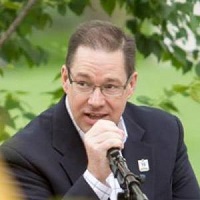A University of Missouri professor thinks Monday night’s debate will likely influence the outcome of the Presidential election.

MU Professor Mitchell McKinney – Photo Courtesy of University of Missouri
M.U. Communications Professor Mitchell McKinney’s been studying presidential debates since the late 1980’s. He advised the Commission on Presidential Debates in 1992, helping develop the “town hall” format. And he’s conducted extensive research of each candidate’s debate performances in this year’s primaries.
McKinney thinks Donald Trump will have to change his approach from the earlier battles when he attacked his opponents as well as the moderators, and often seemed to say whatever was on his mind. “We’re now at a point where I think some voters are expecting, does he have the ability to be more sober, serious, comport himself with a presidential demeanor” said McKinney. “We’ve seen him, I think, more disciplined of late, even on the campaign trail. So I think that’s a challenge for Donald Trump in this debate.”
McKinney also says Trump will have to further develop his responses in a one-on-one setting, versus the primaries when ten candidate were on stage. “We’re going to see, is there substance there. He really can’t sustain an entire debate with, sort of, a one liner with a humorous remark, with sometimes remarks that are really nothing more than self-praise.”
As far as Hillary Clinton goes, McKinney says she needs to avoid getting bogged down explaining scandals which have dogged her. “If she spends the entire evening either based on a moderator, a journalist or her opponent calling her to account for emails, Benghazi, whatever the scandals, whatever the past actions, that’s going to put her very much on the defensive.” McKinney thinks Clinton needs to work to try to change the perception she’s not trustworthy during the 90 minute event, which she won’t be able to do if she’s constantly dealing with the scandals surrounding her.
McKinney says the debate could influence the election’s outcome because there’s still a large number of undecided voters, and because the race has gotten tighter in the past couple of weeks. “If this race remains as tight as it is now, certainly trying to reach a segment of those undecideds could tip the balance.” Polls show undecided voters compose between 3 and 10 percent of the electorate.
McKinney says his historical research points to Monday’s debate being consequential November’s outcome. “In my previous analysis I’ve found that debates were influential in other close presidential contests, including the elections of 1960, 1976, 1980 and 2000”.
Monday’s debate is the first of three scheduled presidential face-offs between Clinton and Trump. It’ll take place at Hofstra University in Hempstead, New York, just outside New York City.
The 2nd debate scheduled for October 9th at Washington University in St. Louis will be conducted in the “town hall” format, which McKinney was instrumental in introducing in 1992.


